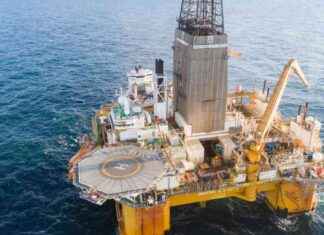The G7 countries want to empty Russia’s war chest with an oil price cap. Kremlin boss Putin is now striking back with a decree and issuing a sales ban for the cartel. In the background he is already setting up a fleet of tankers.
Russian President Vladimir Putin has issued a decree banning the sale of oil to countries that have imposed a price cap on the raw material. “Supplies of Russian oil and oil products to foreign companies and individuals are prohibited if the mechanism for fixing a price cap is directly or indirectly built into these contracts,” says the document published in the afternoon. The ban on oil shipments comes into effect on February 1. For oil products such as gasoline and diesel, the Russian government should set the exact date, although it cannot be earlier than February 1, the decree says.
The price cap for Russian oil was decided by the EU at the beginning of December and is currently 60 US dollars (57 euros) per barrel (159 litres). The G7 countries, Australia and Norway have joined the measure. The price cap is one of the sanctions with which the West is responding to the war of aggression against Ukraine launched by Kremlin chief Putin. The upper limit applies to oil transport by sea. This is intended to limit Russian export earnings and thus reduce the possibilities for financing the Russian war.
Moscow had made it clear before the decision that it rejected the price cap. The Russian leadership speaks of a violation of the free market and has been announcing countermeasures for weeks. The ban was therefore expected. According to experts, it is still unclear whether the price cap will really work. The rationale behind this is to exploit the dominant market position of Western shipping companies and insurance companies in order to prevent Russia from selling its oil on the world market on its own terms. However, there have recently been media reports that Russia has bought up large numbers of old oil tankers in order to ship the raw material with its own funds.






